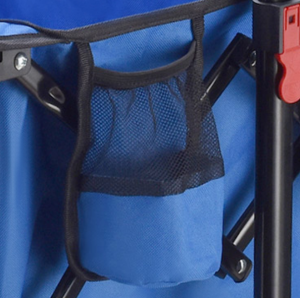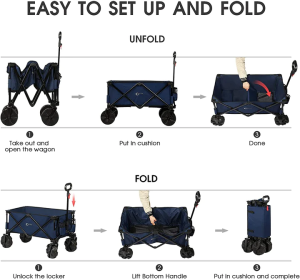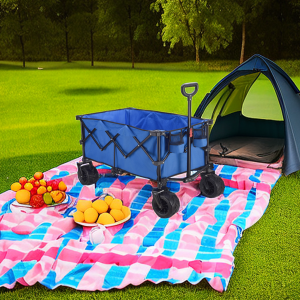More
The Weighty Matter of Folding Camping Wagons: Understanding Weight Capacity
The Weighty Matter of Folding Camping Wagons: Understanding Weight Capacity
Camping is all about embracing the outdoors, getting close to nature, and enjoying the simpler things in life. However, there’s one aspect of camping that’s not so simple: transporting your gear from your vehicle to your campsite. This is where a camping folding wagon can be a game-changer. But before you load it up with all your camping essentials, it’s crucial to understand its weight capacity. In this article, we’ll delve into the weighty matter of camping folding wagons, helping you make informed decisions about what to carry and how to make the most of this trusty outdoor companion.

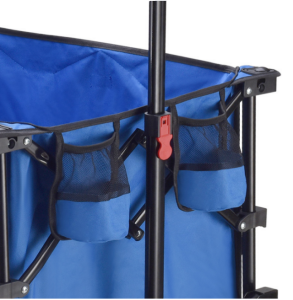

**1. Why Weight Capacity Matters:
The weight capacity of a camping folding wagon refers to the maximum load it can carry without compromising its structural integrity or safety. Exceeding this weight limit can lead to premature wear and potential damage to the wagon, making it essential to understand and respect this specification.
**2. Assessing Your Gear:
Before selecting a camping folding wagon, take an inventory of your camping gear and supplies. Consider the weight of items like tents, sleeping bags, camp chairs, coolers, cooking equipment, and any other gear you plan to transport with the wagon. Be thorough in your assessment, as underestimating the weight can lead to overloading issues.
**3. Matching Capacity to Needs:
Camping folding wagons come in various weight capacity ranges, typically between 100 to 300 pounds or more. Choose a wagon that matches or slightly exceeds the combined weight of your gear. It’s always a good idea to have a buffer to account for any additional items you might pick up along the way.
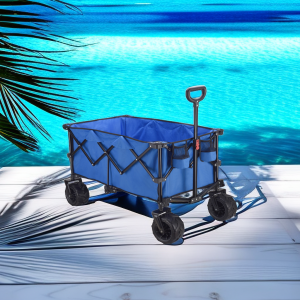
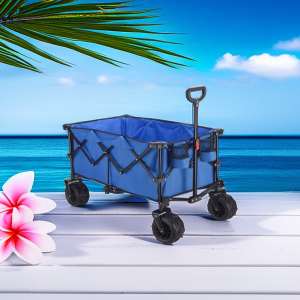
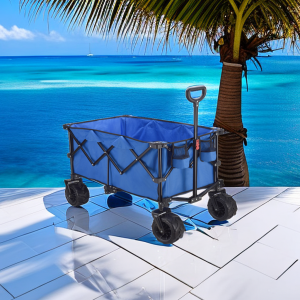
**4. Distributing the Load:
Once you’ve selected a wagon with an appropriate weight capacity, focus on how you distribute the load. Place heavier and bulkier items at the bottom of the wagon to create a stable foundation. Lighter items like clothing, bedding, and smaller gear can be placed on top.
**5. Securing Your Load:
Use bungee cords, straps, or wagon-specific accessories to secure your gear in place. This helps prevent items from shifting during transport and potentially falling out.
**6. Avoid Overloading:
Resist the temptation to overload your wagon, even if it’s within its weight capacity. Overloading can strain the wagon’s frame, wheels, and fabric, leading to premature wear and potential safety hazards.
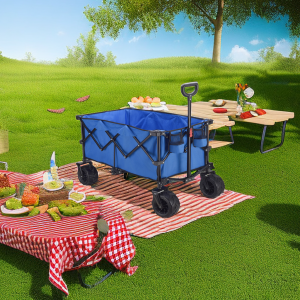
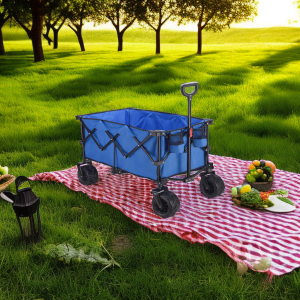
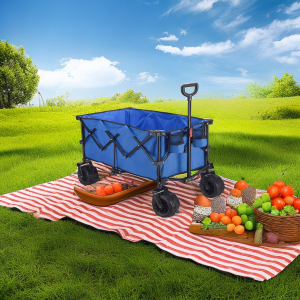
**7. Regular Maintenance:
To ensure that your camping folding wagon continues to perform well, conduct regular maintenance checks. Inspect the frame, wheels, and fabric for signs of wear and tear, and address any issues promptly. Lubricate moving parts, if necessary, to maintain smooth operation.
**8. Environment Considerations:
Keep in mind that the terrain you’ll be navigating can affect the strain on your wagon. Rough or uneven terrain may place more stress on the wagon, so consider the type of environment you’ll be camping in when assessing your gear’s weight.
**9. Sharing the Load:
If you’re camping with a group or family, distribute the gear among multiple wagons if needed. This not only helps spread the load but also makes the process more manageable.
Product link
Alibaba.com: Aicathlon Folding Wagons for Camping
Made in China: Aicathlon Folding Wagons for Camping
Other Camping Gear
Aicathlon Sleeping Bag Aicathlon Camping Tent Aicathlon Camping Tarp Aicathlon Camping Table&Chair
In conclusion, understanding the weight capacity of your camping folding wagon is essential for safe and efficient gear transport. By assessing your gear, choosing an appropriate wagon, distributing the load wisely, and conducting regular maintenance, you can make the most of this valuable outdoor companion. With your wagon in tow, you’ll be well-prepared to embark on camping adventures that are lighter on logistics and heavier on enjoyment. Happy camping!


